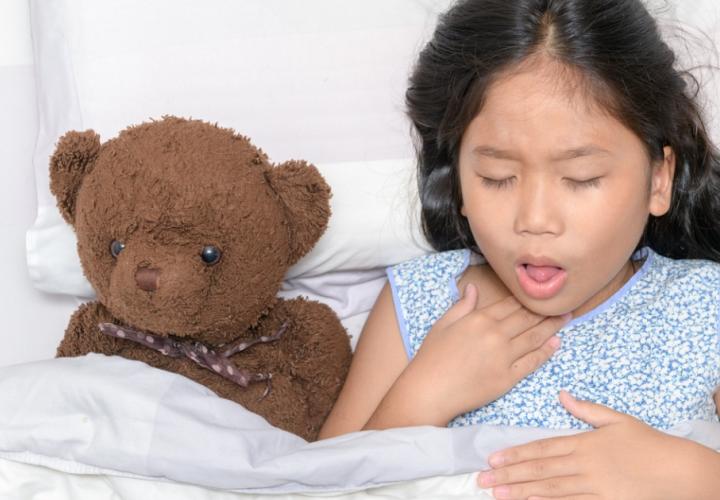This blog was originally published in 2023 and has been updated in February 2025.
What is RSV? How is it different from the flu? When should I call my pediatrician or seek emergency care? Connecticut Children’s pediatric experts have the answers you need to get through respiratory season.
See Why We’re the Ones Parents Trust
As experts, we’d like to partner with you in your child’s health and well-being, as they grow.
What is RSV and how serious can it get?
RSV is a virus that causes just one of many respiratory illnesses in infants, kids, and even adults. For most of us, it’s not new, and your child has likely already had it before turning 2. But RSV can be very serious for:
- Infants a year or younger
- Children younger than 2
- Kids who are immunocompromised or who have existing lung disease, like asthma
RSV is also the most common cause for pneumonia and bronchiolitis (a fancy term for a bad cold—and different from bronchitis!) in very young kids.
>Related: Are Your Child’s Symptoms from RSV or Something Else? What to Know About this Common Illness
How is RSV different than the flu?
RSV and the flu are two different viruses, but often have very similar symptoms. Sometimes, the symptoms are no more severe than those of a common cold. Other times, they can be life-threatening.
Common symptoms of RSV:
- Fever, but not always
- Loss of appetite
- Cough, often with wheeze. The cough can sound startling.
- Runny nose
Common symptoms of the flu:
- Body aches
- Chills
- Cough
- Fatigue
- Fever
- Headache
- Sore throat
- Stuffy nose
- Diarrhea and vomiting—sometimes
The kicker? It’s possible to have both the flu and RSV at the same time. An in-office test can confirm.
> Related: How Can I Tell if My Child Has the Flu or COVID-19?
Antibiotics can treat both RSV and the flu, right?
No. Antibiotics do not work against viral infections. But if your child develops an ear infection from the congestion caused by the virus, your doctor may prescribe them to treat the newly formed infection. Sometimes, if appropriate and depending on how old your child is, your doctor may prescribe an antiviral like Tamiflu to lessen the severity of flu symptoms.
When should I call 911 or go to the emergency room?
Look for these signs:
- Trouble breathing or fast breathing. Look for ribs pulling with each breath.
- Change in color in face—usually bluish skin and lips
- Fever of 100.4 or higher in infants younger than 3 months- call pediatrician on-call first
- Fever of 105 or higher, regardless of age- call pediatrician on-call first
- Fever of 102 or higher, lasting more than two days. This is to rule out any bacterial infections like meningitis.
- Not alert when awake
- Dehydration (no urine for 8 or more hours, mouth is dry and no tears are forming)- call pediatrician on-call first
In a true emergency, always call 911. Trust your parental instinct.
>Related: When is a fever an emergency?
My child’s cough is never ending and gives me anxiety. Should I go to the ER for constant cough alone?
Usually not. Most of the time, while scary to hear, cough is our friend. It’s pushing out all the bad stuff and works to help your child ultimately get better. The challenge is, sometimes cough can be accompanied by wheezing or breathing difficulties—and it may get a lot worse at night.
If your child is having trouble breathing, definitely call 911. But for a cough alone, rest, a cold-mist humidifier, nebulizer if your doctor says so, elevating the mattress, and encouraging lots of fluids can all make a difference. Ask your pediatrician about FDA-approved medications that could help before you try administering anything on your own. Stay away from the homeopathic stuff as it hasn’t been studied in depth.
As a general rule, if your child’s cough hasn’t improved after two full weeks, give your pediatrician a call for a wellness check. There are so many factors—oftentimes unexplained—that can cause the “100-day” cough.
How can I prevent my child from getting either the flu or RSV?
1. Protection is always the best prevention!
- For the flu: There is an FDA-approved influenza vaccine that comes out each year. If you have an infant 6 months or older, and this is their first time, they’ll need two doses about a month apart. Your pediatrician will explain.
- For RSV: There is now a RSV shot that is available to children who meet certain criteria.
2. Consult your strategy toolbox, too.
Think back to all the strategies you pulled out of your toolbox during the many waves of COVID-19: wash hands, mask up when necessary, and wipe down surfaces. And please- stay home if you're sick!
